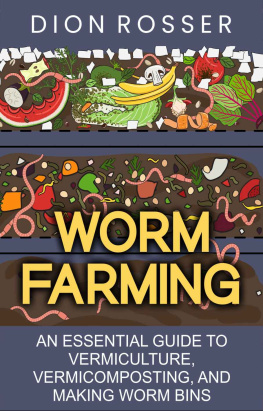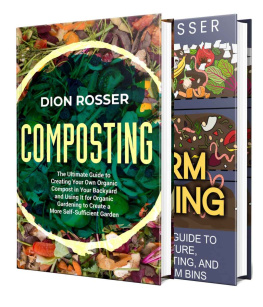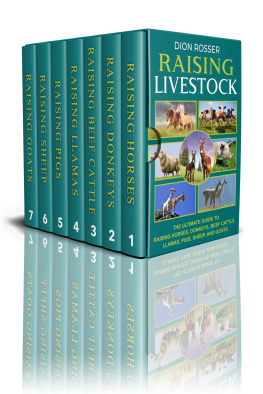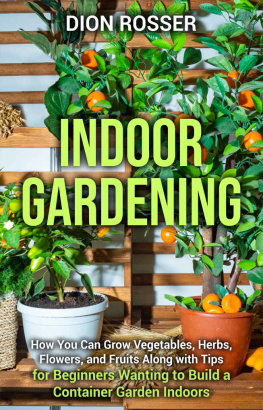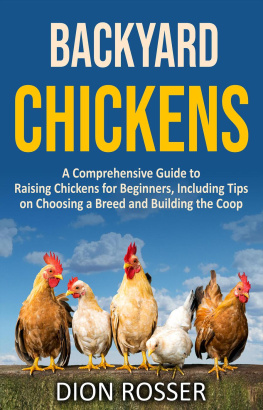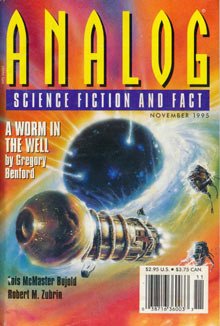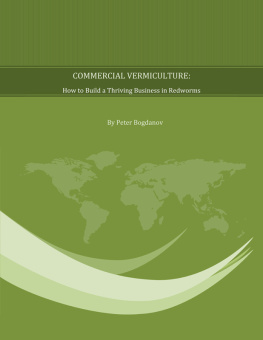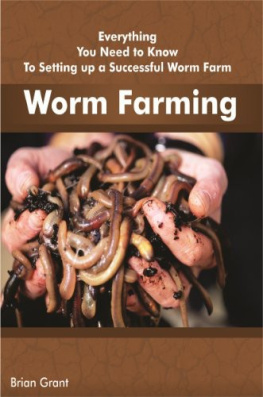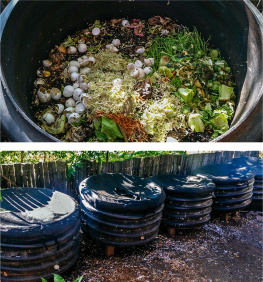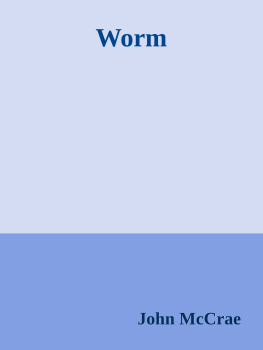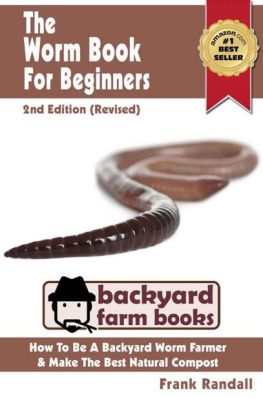Dion Rosser - Worm Farming: An Essential Guide to Vermiculture, Vermicomposting, and Making Worm Bins
Here you can read online Dion Rosser - Worm Farming: An Essential Guide to Vermiculture, Vermicomposting, and Making Worm Bins full text of the book (entire story) in english for free. Download pdf and epub, get meaning, cover and reviews about this ebook. year: 2021, genre: Children. Description of the work, (preface) as well as reviews are available. Best literature library LitArk.com created for fans of good reading and offers a wide selection of genres:
Romance novel
Science fiction
Adventure
Detective
Science
History
Home and family
Prose
Art
Politics
Computer
Non-fiction
Religion
Business
Children
Humor
Choose a favorite category and find really read worthwhile books. Enjoy immersion in the world of imagination, feel the emotions of the characters or learn something new for yourself, make an fascinating discovery.
- Book:Worm Farming: An Essential Guide to Vermiculture, Vermicomposting, and Making Worm Bins
- Author:
- Genre:
- Year:2021
- Rating:3 / 5
- Favourites:Add to favourites
- Your mark:
- 60
- 1
- 2
- 3
- 4
- 5
Worm Farming: An Essential Guide to Vermiculture, Vermicomposting, and Making Worm Bins: summary, description and annotation
We offer to read an annotation, description, summary or preface (depends on what the author of the book "Worm Farming: An Essential Guide to Vermiculture, Vermicomposting, and Making Worm Bins" wrote himself). If you haven't found the necessary information about the book — write in the comments, we will try to find it.
Dion Rosser: author's other books
Who wrote Worm Farming: An Essential Guide to Vermiculture, Vermicomposting, and Making Worm Bins? Find out the surname, the name of the author of the book and a list of all author's works by series.
Worm Farming: An Essential Guide to Vermiculture, Vermicomposting, and Making Worm Bins — read online for free the complete book (whole text) full work
Below is the text of the book, divided by pages. System saving the place of the last page read, allows you to conveniently read the book "Worm Farming: An Essential Guide to Vermiculture, Vermicomposting, and Making Worm Bins" online for free, without having to search again every time where you left off. Put a bookmark, and you can go to the page where you finished reading at any time.
Font size:
Interval:
Bookmark:
Worm Farming
An Essential Guide to Vermiculture, Vermicomposting, and Making Worm Bins
Copyright 2021
The content contained within this book may not be reproduced, duplicated, or transmitted without direct written permission from the author or the publisher.
Under no circumstances will any blame or legal responsibility be held against the publisher, or author, for any damages, reparation, or monetary loss due to the information contained within this book, either directly or indirectly.
Legal Notice:
This book is copyright protected. It is only for personal use. You cannot amend, distribute, sell, use, quote, or paraphrase any part, or the content within this book, without the consent of the author or publisher.
Disclaimer Notice:
Please note the information contained within this document is for educational and entertainment purposes only. All effort has been executed to present accurate, up-to-date, reliable, complete information. No warranties of any kind are declared or implied. Readers acknowledge that the author is not engaging in the rendering of legal, financial, medical, or professional advice. The content within this book has been derived from various sources. Please consult a licensed professional before attempting any techniques outlined in this book.
By reading this document, the reader agrees that under no circumstances is the author responsible for any losses, direct or indirect, that are incurred due to the use of the information contained within this document, including, but not limited to, errors, omissions, or inaccuracies.
Table of Contents
Introduction
Chapter 1: The Quick Guide to Worm Farming
Chapter 2: Striking Black Gold
Chapter 3: The Battle of the Best Worms
Chapter 4: Choosing a Bin for Composting
Chapter 5: Gathering the Farming Materials
Chapter 6: Layering Your Bin for Success
Chapter 7: Feeding Time
Chapter 8: Foods and Waste to Avoid
Chapter 9: How to Harvest a Worm Bin
Chapter 10: Dealing with Wormy Situations
Conclusion
Heres another book by Dion Rosser that you might like
References
Waste management is one of the biggest global problems that face our modern world. Whether its regular garbage, trash going to the dump, or organic matter, our mark on this world is becoming more and more obvious. It is easy to throw everything into our garbage bins and have someone else take care of the problem, but that problem will only come back to haunt us. There has to be a better way to reduce our footprint when it comes to garbage, and, thankfully, there is.
Worm farming is a relatively new concept, but it is an amazing way to dispose of our organic waste while making a difference in the world. The process involves worms that eat unwanted organic waste and provide you with compost and castings. Waste is kept out of your garbage bin and is returned to the earth as energy for new growth. And not only are you reducing your household waste, but you are also saving money on compost and fertilizers.
These amazing worms take your waste and create nectar for the earth. This book will take you through everything you need to know about worm farming, including the best types of worms to use, where to get them, and what to feed them. Youll also learn how to use the resulting fertilizer in your garden. In addition, youll find out more about the methods, ethics, and types of worm farming, along with a sprinkling of pro tips.
We have all the latest worm farming information mixed in with the traditional methods that have been proven to work over the years. While this book is primarily aimed at beginners, pro worm farmers will find useful information inside too. You can never have too much knowledge when it comes to creating the very best compost. We have compiled everything you need to get you started on your journey into worm farming.
So, what are we waiting for? Lets get started.
The word worm may make you cringe if you only associated them with the slimy, slithering things that crawl through the soil, with a particular liking for organic waste. Worms love organic matter and lay tiny white eggs in partially decomposed food remains, their population doubling every few months. These worms procreate in and feed on organic waste and turn that waste into amazing compost. That makes worm farming, also known as vermiculture, perfect for reducing waste and creating a perfectly balanced fertilizer that is organic and requires no maintenance. And the best part about vermicomposting is that it doesnt smell at all!
In this chapter, youll learn the basics of worm farming, worm castings, worm tea (yes, thats a thing), and a brief description of vermiculture, from feeding the worms to the technique of collecting black gold (worm fertilizer). Well also help you understand the various benefits of having vermicomposting bins in your garden or home.

Having a vermicomposting bin or a worm farm means you have an excellent way of disposing of unwanted organic matter and creating fertilizer since worms eat a multitude of kitchen waste and other organics. You can put your food waste into your worm farm, and the ever-hungry worms will chew through the garbage, leaving you with only the good stuff. It is important to understand that the worm castings found in worm farms are different from the castings you find elsewhere. The worms used in vermiculture are a certain type of worm, differing from regular garden worms. These extraordinary food processing machines have a fantastic appetite! All you need for worm farming is to find a shaded corner, such as your balcony, school classroom, or your kitchen. The farms dont take up much space and can prove to be an excellent addition to your home.
Worm Castings
Worms are known to consume anything and everything organic. Since they eat compostable material, their waste creates an organic form of fertilizer known as worm casting or black gold. Vermicomposting (or vermiculture ) is the process of making worm castings. This form of fertilizer is believed to be the best-known fertilizer globally, hence the name black gold. A natural by-product of vermicomposting worm castings is probably the most compelling reason to start worm farming. The black gold, or worm poop, is proven to be rich in nutrients, helps improve drainage, aerates the soil, and increases water retention. Recognized by their thick brown sludge-like texture, worm castings can be added to compost or used in potting mix. Worm castings are so strong that even using small amounts of it while planting or repotting plants can give amazing results.
Worm Tea
In a vermicomposting bin, worms help decompose organic matter to produce manure filled with beneficial microbes. Worm tea is the liquid concentrate of the compost formed by worms. Its a natural liquid fertilizer that can be obtained from soaking worm castings in water overnight. This tea is an excellent fertilizer that can help boost plant growth. However, worm tea must not be confused with worm leachate, which is the drainage liquid accumulated at the bottom of the vermicomposting bin. The worm leachate, unlike worm tea, can prove to be harmful to certain plants. Yet, both worm tea and worm leachate can be used as fertilizer for your soil and plants if used correctly.
You can easily set up and maintain a worm farm. A vermicomposting bin enables you to recycle your garden or kitchen waste into one of the best fertilizers in the world. The amount of effort and time that youre required to invest in vermiculture is very little compared to the benefits you can reap from it.
Font size:
Interval:
Bookmark:
Similar books «Worm Farming: An Essential Guide to Vermiculture, Vermicomposting, and Making Worm Bins»
Look at similar books to Worm Farming: An Essential Guide to Vermiculture, Vermicomposting, and Making Worm Bins. We have selected literature similar in name and meaning in the hope of providing readers with more options to find new, interesting, not yet read works.
Discussion, reviews of the book Worm Farming: An Essential Guide to Vermiculture, Vermicomposting, and Making Worm Bins and just readers' own opinions. Leave your comments, write what you think about the work, its meaning or the main characters. Specify what exactly you liked and what you didn't like, and why you think so.

